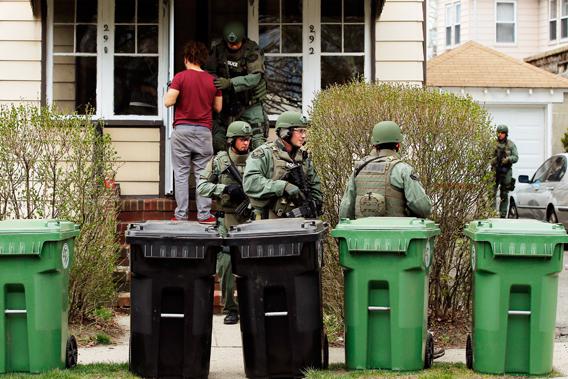SWAT teams descended on the Boston suburb of Watertown on Friday morning to conduct a door-to-door search for the Boston Marathon bombing suspect left alive after a convenience store robbery, car chase, and shootout Thursday night. Is it legal for the police to search your house without a warrant?
It can be. Under the Fourth Amendment, a judge issues a warrant if police can demonstrate that a search is “reasonable”—that there is “probable cause” to investigate a house, car, or backyard for evidence. But there are plenty of circumstances under which police can perform searches without invoking probable cause.
If you consent to a police search, officers do not need a warrant to enter your home. If you have a housemate, he or she can allow the police to rummage through common areas, such as the living room or the kitchen, but not private areas, such as your closet or bedroom.
In exigent circumstances, or emergency situations, police can conduct warrantless searches to protect public safety. This exception to the Fourth Amendment’s probable cause requirement normally addresses situations of “hot pursuit,” in which an escaping suspect is tracked to a private home. But it might also apply to the events unfolding in Boston if further harm or injury might be supposed to occur in the time it takes to secure a warrant. A bomber believed to be armed and planning more violence would almost certainly meet such prerequisites.
Furthermore, police may enter a private residence to provide emergency assistance to an occupant—which may include apprehending a suspected terrorist who also happens to be inside. And if they plan to make an arrest in someone’s home, they can undertake a “protective sweep” of the dwelling first to confirm that no weapons or accomplices are stashed away where they can do damage later.
Should these justifications fail, the police could also just conduct a search that violates the Fourth Amendment, knowing that whatever evidence they turn up might not be admissible in court. If their first priority is securing public safety, such a bargain doesn’t seem too awful.
Bonus Explainer:
What if the cops are searching my house for bombers and they find a brick of cocaine on my coffee table?
You’re in trouble. According to the “plain view” doctrine, if police already have a right to be in your house and they notice evidence of a crime, they are entitled to seize that evidence for use against you in court. Of course, the SWAT teams searching for Dzhokhar Tsarnaev probably have more on their minds right now than illegal drug use.
Explainer thanks Kevin Cole of the University of San Diego School of Law.
Got a question about today’s news? Ask the Explainer.
Read more on Slate about the Boston Marathon bombing.
